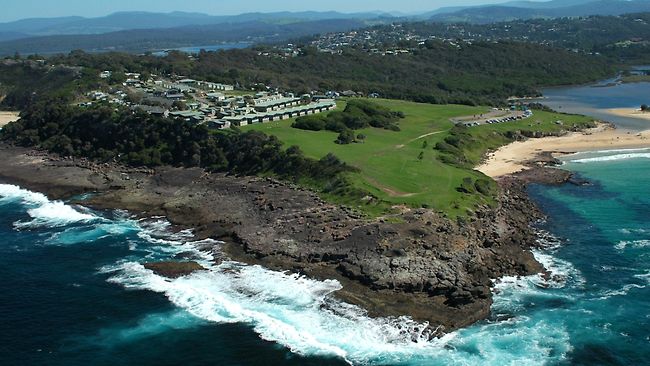
The Short Point Recreation Reserve at Merimbula has endured a rabbit infestation. Photo: Supplied.
The Easter Bunny notwithstanding, it could well be curtains for Merimbula’s coastal rabbit population as Bega Valley Shire Council takes advantage of the current absence of holidaymakers and the temporary closure of the nearby caravan park and cabins to conduct a rabbit shooting trial at the Short Point Recreation Reserve.
Last year, authorities released the newest strain of calicivirus as a measure to cull the local rabbit population, however the shooting trial is a secondary control measure that should amplify the effects of the virus on population spread.
Short Point has been a focus for Bega Valley Shire’s rabbit control measures for some time due to its status as a regional attraction and the detrimental impact the rabbit population is having on native vegetation at recreation reserve.
The night trial will take place between 8 pm and 5 am from 14-16 April and Short Point Road will be closed from Cliff Street during those hours.
Anthony McMahon, Bega Valley Shire director, assets and operations, said the closure of Beach Cabins Merimbula and Merimbula Beach Holiday Resort as part of current COVID-19 social distancing measures had opened a window to allow the trial to go ahead with a minimum of disruption to tourists, the local community and businesses.
He said the culling work would be undertaken by an appropriately licensed contract shooter and in collaboration with South East Local Land Services and other local landholders.
“Rabbits are a major threat to biodiversity and agricultural production in the Bega Valley Shire, and therefore have a significant impact on the economy, the environment and the community.
“We hope to gather information as part of this trial to inform the development of a broad rabbit management plan for the shire.”
Mr McMahon said council had three distinct aspects to its role in rabbit management across the Bega Valley Shire – to manage rabbits on council land; to support the community to undertake effective rabbit control; and to assist public and private landholders to achieve coordinated rabbit control.
“A rabbit management plan will ensure the strategic allocation of limited resources aimed at achieving effective rabbit control across the shire. Our overarching vision is to protect areas of high biodiversity, productive agricultural land and community facilities under threat of damage by rabbits,” he said.
The management of rabbits is driven by state and federal legislation, and policies including legal requirements under the NSW Biosecurity Act 2015, for landowners to control and prevent the spread of rabbits.
The RHDV1 K5 (Rabbit Haemorrhagic Disease Virus) calicivirus strain causes fatal haemorrhagic disease in the European rabbit. The species-specific virus continues to live in this community of rabbits and re-emerges naturally when seasonal variances allow it to do so. It is not harmful to any other species.








